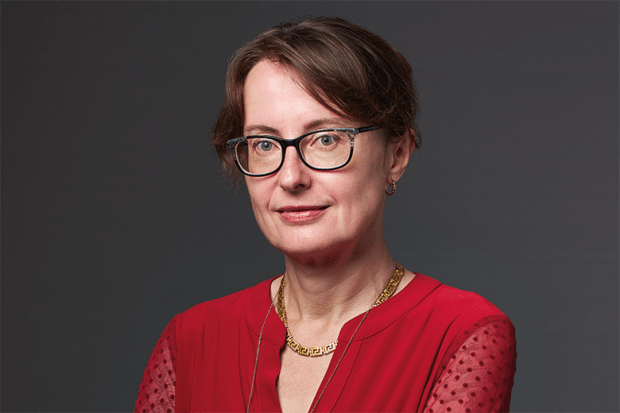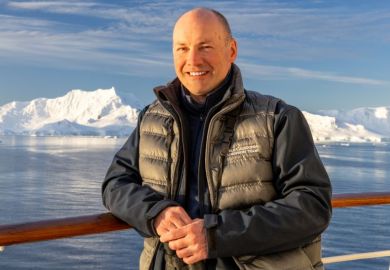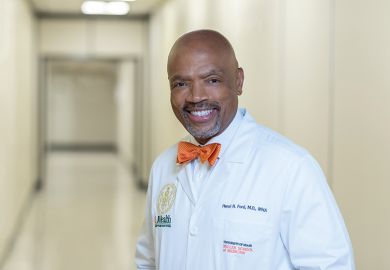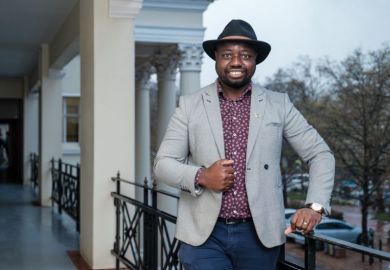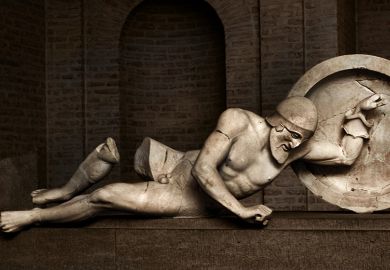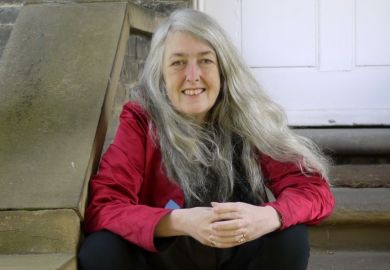Emily Wilson is professor of classical studies at the University of Pennsylvania, best known for her translation of Homer’s Odyssey – the first by a woman into English – and, more recently, Iliad.
When and where were you born?
Oxford, UK, in 1971. My mother, Katherine Duncan-Jones, who died in 2022, taught English literature at Somerville College and specialised in Elizabethan and Jacobean literature. My father, A. N. Wilson, is a writer. My sister, Bee Wilson, is a food writer.
How did that upbringing shape who you are?
I grew up with parents who assumed that my sister and I would spend most of our free time reading, and instilled in us a deep interest in history, poetry, theatre, literature, language and art. I’ve distanced myself in certain ways from the north Oxford of my childhood – most obviously by moving to the US – but I’m grateful to have grown up with a love of books and learning.
What are those other ways in which you were distancing yourself?
North Oxford is known for academics and academic-ish people, and a certain snobbery and cliquishness that I wanted to try to get away from. Also, I was conscious when I was growing up that people knew who my father was – his writing is much better known in the UK than around the world. So I wanted to not necessarily be defined as the daughter of my father, or as the daughter of my mother.
And you did that by becoming a writer yourself?
I have a lot in common professionally with both of my parents, but I wanted to figure out what my own path was without having people decide it was going to be a mirror of my parents. I did that partly by moving to the US, trying to make sure I was exposed to a different model of academia and then just putting in the time to work out what I wanted to write about.
Your groundbreaking translation work has led to the idea that it brings a feminist perspective to the Classics – is that the case?
The whole spin of, “there’s something feminist about my translations” – I think that’s bogus. When my Odyssey translation came out, every interviewer would endlessly ask me about my gender, and I got very sick of it. But it did make me realise that the field of anglophone re-translations of ancient texts has been extremely male dominated.
Why might that gender disparity exist?
Re-translations are often commissioned by editors, and there can be some networking things and questions about who an editor thinks of as the right classicist to take on this big translation project. Maybe it hasn’t very often been a woman that gets approached, even if there are plenty of well-qualified women who might be interested in doing that. There are also factors that have to do with pedagogy and training in language in classical studies. And then there’s the place of translation in the academy. There are growing numbers of institutions that have centres for translation, but with the difficult question of where translation fits within history or historical studies – is it a form of scholarship or is it not? It’s very often presented as an outreach thing that doesn’t require original thought, and it then tends to be done by retired people or people who don’t have to get tenure. And usually it’s retired men.
Is the end goal to somehow get inside the author’s mind and be as accurate a translator as possible, or is it more like the way a cover band might intentionally put its own flavour on a Beatles song?
If the Beatles themselves were performing their work in German, they were going to sound quite a lot different than if they were performing their work in English. There’s no possible way to be exactly the same as Homer but in a completely different language and completely different cultural context. My goal is to create something as close as possible to equivalent. But there are many different types of equivalence – thematic equivalence, sonic equivalence, poetic equivalence, dynamic equivalences of different kinds. If I want to make this audience have the same feelings that the archaic Greek audience might have had about this character, how do I do that? It’s not obvious.
What are the biggest misconceptions about your field of study?
One is that ancient Greek and ancient Roman cultures were somehow superior to all other ancient cultures – through the magical “greatness” of their ideas, art, literature, politics or philosophy. The other is the idea of “Western civilisation” as the special property of white people. Those of us who work in this field have a lot of work to do to unpick these false and harmful ideas, and to look squarely at the history of our own discipline in how it’s been intertwined with snobbery and racism.
What’s behind that impression?
The study of antiquity historically has very often been tied up with the structures of power that have been implicated with racism and classism. If you think about the US Constitution and the ways that the founders were looking back to the Roman republic, there was this idea of checks on democratic impulses and the possibilities of both liberty for all and enslavement – that those things can go together. Also, the ways that education in Latin and ancient Greek has very often been a tool for distinguishing who counts as a gentleman and who doesn’t.
What are the best and worst things about your job?
I love having the freedom to spend a lot of every day reading and writing, and to take on new projects. I love my colleagues and my students, and it’s a joy to get to talk to people, inside and outside the academy, about topics that are very important to me. The worst parts are email, some elements of administration and stress. I wish I could avoid internalising any of the pressures of academia, but I don’t always manage that.
What do you mean by internalising the pressures of academia?
Academia can be very pressurising, partly because it relies on the idea that there’s no nine-to-five after which you can stop thinking about things. And the people who go through academia tend to care enormously about the education system, and care about succeeding within it. So, the mentality of “I must get an A in every class” can linger with you, even when getting an A might not be what it’s about any more – and in fact maybe it should never have been.
What advice do you give to your students?
Pay attention. The topics I teach – ancient literature and languages, ancient history, poetry – might not be central to their lives in the future. But the skills you learn in a humanities classroom – of attentiveness and the ability to assess and analyse complex questions and sift through complicated and diverse sources – are essential for life in a changing world, no matter what profession you go into in the future.
paul.basken@timeshighereducation.com
CV
1990-94 Bachelor of arts in classical literature and philosophy, Balliol College, Oxford
1994-96 Master of philosophy in English Renaissance literature, Corpus Christi College, Oxford
1996-2001 PhD in Classics and comparative literature, Yale University
2002-present Assistant, associate and then full professor of classical studies, University of Pennsylvania
2003 Charles Bernheimer Prize from the American Comparative Literature Association
2004 Mocked with Death: Tragic Overliving from Sophocles to Milton
2006 Rome Prize Fellowship from the American Academy in Rome for Renaissance and Early Modern Studies
2007 The Death of Socrates: Hero, Villain, Chatterbox, Saint
2010 Six Tragedies of Seneca (translation with introduction and notes)
2014 The Greatest Empire: A life of Seneca
2017 Odyssey (verse translation and introduction)
2023 Iliad (verse translation and introduction)
Appointments
Jacinta Ruru has been appointed as the University of Otago’s inaugural deputy vice-chancellor Māori, a role intended to promote Māori content, delivery and methodology in the university’s research and teaching. A faculty member at Otago since 1999, Professor Ruru was made the first Māori professor of law in 2016. She said she was “really proud” Otago had invested in creating the new position and it was an “incredible honour” to be appointed.
Cas Holloway is joining Columbia University as its first chief operating officer. A former New York City deputy mayor for operations, Mr Holloway later worked as deputy chief operating officer for Bloomberg. Columbia president Dame Minouche Shafik said she was “delighted” to bring Mr Holloway to the university “after a distinguished career as a public servant, business leader and entrepreneur”.
Christian Landau has been named vice-president for degree programmes and professor of strategy and innovation at the Frankfurt School of Finance & Management. He joins in April from EBS Business School, where he is currently dean.
Shing-Wai Wong has been appointed as executive education director of UCL’s Global Business School for Health, joining from the University of Oxford’s Saïd Business School, where she served as associate director of executive education.
David Lively has been promoted to vice-president for alumni relations and development at Northwestern University, having previous been senior associate vice-president.
Martin George has joined Aston University as associate dean of law. He was previously professor of land law at City, University of London.
Sam Todd has been appointed associate vice-president and vice-provost for global affairs at the University of South Carolina. He was previously associate dean for faculty, operations and international partnerships in the College of Hospitality, Retail and Sport Management.
Register to continue
Why register?
- Registration is free and only takes a moment
- Once registered, you can read 3 articles a month
- Sign up for our newsletter
Subscribe
Or subscribe for unlimited access to:
- Unlimited access to news, views, insights & reviews
- Digital editions
- Digital access to THE’s university and college rankings analysis
Already registered or a current subscriber? Login
